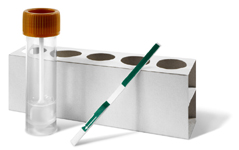Speed Giardia
Rapid detection of soluble Giardia duodenalis cyst antigens
| Presentation | Advantages | |
|---|---|---|
|
Method: Immunochromatographic strip test Analysis: Detection of Giardia duodenalis cysts Sample: faeces Preparation: 5 minutes Reading: 5 minutes Storage: 16 months at room temperature (2°C to 30°C) Presentation: 5 tests Reliability: Compared with the reference method, laboratory ELISA: Detection threshold: 80 cysts / g of faeces (1) |
|
| Why to use Speed Giardia ? |
|---|
|
Infestation of young animals, through the ingestion of cysts (e.g. from drinking water) leads to a maldigestion-malabsorption syndrome and growth retardation. The prevalence of Giardia varies as a function of the host species: |
| When to use Speed Giardia ? |
|---|
|
In young dogs and cats, Speed Giardia is recommended between 6 weeks and 5 months of age, especially in cases of chronic and intermittent diarrhea that do not respond to classic antiparasitics. Speed Giardia is indicated in older cats in the event of chronic diarrhea. In young calves, from 8 days to 6 months of age, Speed Giardia can be used to identify the cause of diarrhea and growth retardation that are responsible for significant economic losses. |
Instructions for use
Bibliography
(1) Internal study, BVT, on 75 dogs and cats.
(2) KULDA J., NOHYNLOVA E. Giardia in humans and animals in parasitic protozoa. JP Kreizer (Ed). 2nd edition. Academic Press, London, 1995, Vol. 10 (430)
(3) PITEL P.H. et coll.: Giardiose: une cause émergente d’entérite néonatale en France. Point Vétérinaire, 2003, 238
(4) TRULLARD F. Etude de la prévalence de l’infection des veaux par Giardia duodenalis en Pays de Loire. Thèse Med Vet Nantes, 2002


 Giardiasis is a parasitic infection caused by the colonization of the intestinal mucosa with Giardia duodenalis. This zoonosis affects dogs, cats and calves.
Giardiasis is a parasitic infection caused by the colonization of the intestinal mucosa with Giardia duodenalis. This zoonosis affects dogs, cats and calves.